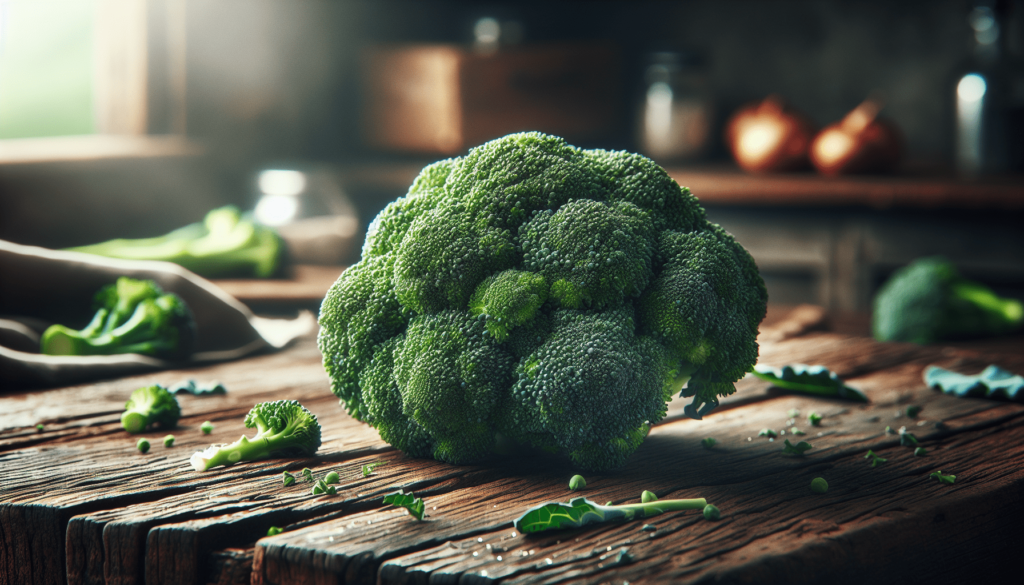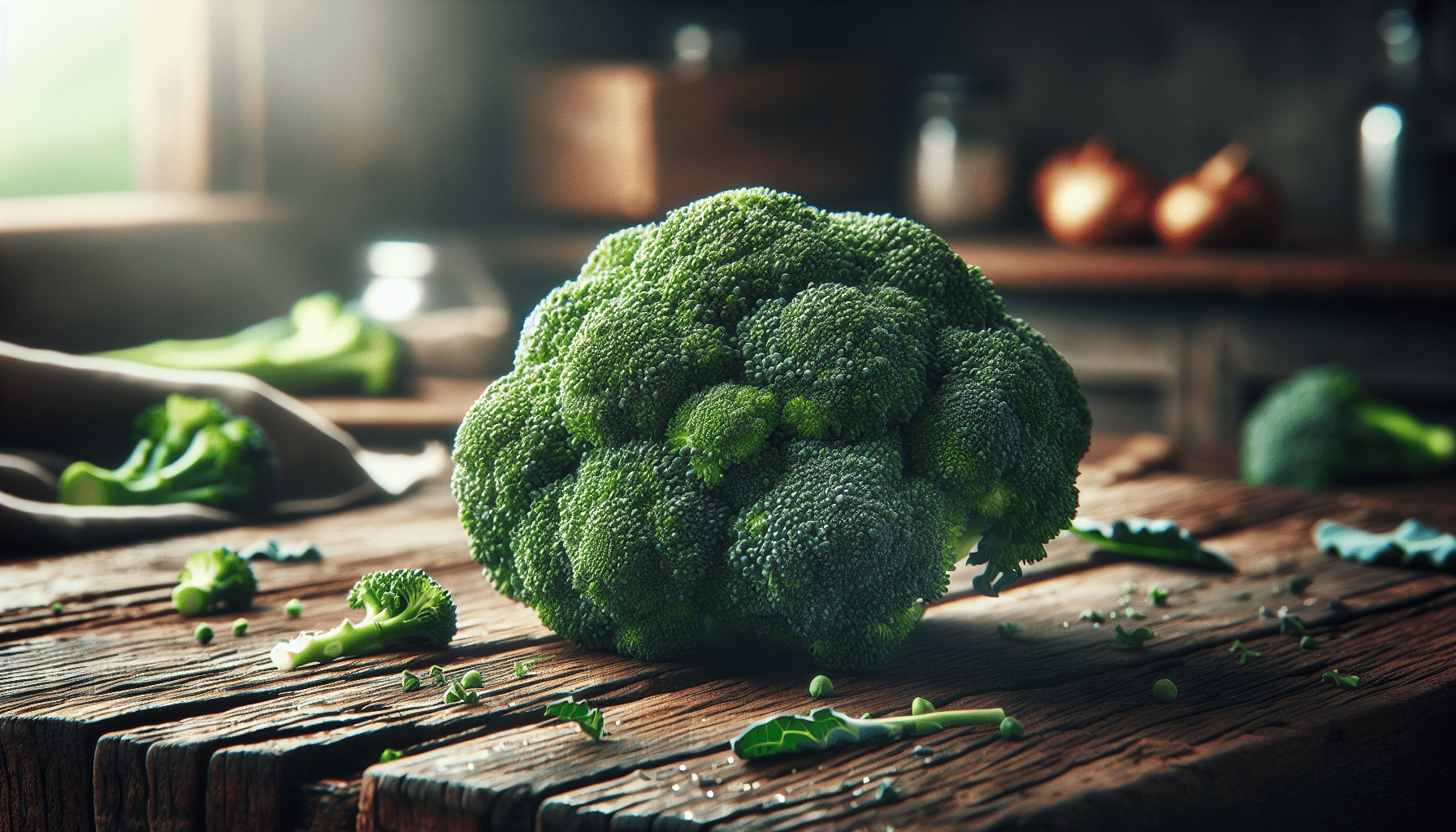Welcome to “The Ultimate Guide To Disease Prevention With Broccoli.” In this informative and easy-to-follow guide, you’ll discover how this vibrant green vegetable can become a powerful ally in your quest to maintain good health and ward off diseases. From its rich array of vitamins and minerals to its potent antioxidants, broccoli is more than just a tasty side dish – it’s a nutritional powerhouse that can help you boost your immune system, reduce inflammation, and even lower the risk of chronic illnesses. Dive in and unlock the secrets of making broccoli a staple in your diet for a healthier, happier you! Have you ever wondered how a simple vegetable could have such a profound impact on your health? Well, if you’re curious about the potential superpowers residing in one of the most common greens, you’re in the right place. Let’s dive into the incredible world of broccoli and discover how it can help you prevent various diseases.
What Makes Broccoli a Superfood?
Broccoli, often touted as a superfood, is more than just a side dish to your main course. This cruciferous vegetable is packed with an array of nutrients and compounds that contribute significantly to your overall well-being. It’s an excellent source of vitamins, minerals, fiber, and antioxidants, all of which play crucial roles in disease prevention.
Nutritional Breakdown of Broccoli
To understand why broccoli is so beneficial, let’s first break down its core nutritional components. Here’s a table summarizing the key nutrients found in 100 grams of raw broccoli:
| Nutrient | Quantity |
|---|---|
| Calories | 34 |
| Proteins | 2.8 grams |
| Carbohydrates | 6.6 grams |
| Fiber | 2.6 grams |
| Vitamin C | 89.2 mg |
| Vitamin K | 101.6 mcg |
| Folate | 63 mcg |
| Potassium | 316 mg |
| Calcium | 47 mg |
| Iron | 0.7 mg |
As you can see, broccoli is a nutrient powerhouse with a low calorie count, making it an ideal addition to your diet.
Antioxidants: The Defenders of Your Health
Antioxidants are compounds that fight oxidative stress—a condition that can lead to chronic inflammation and various diseases. Broccoli is rich in antioxidants like vitamin C, beta-carotene, and other phytonutrients. These antioxidants neutralize harmful free radicals, thereby reducing oxidative stress and lowering the risk of chronic diseases such as heart disease and cancer.
Broccoli for Heart Health
Heart disease remains one of the leading causes of death globally, but including broccoli in your diet can make a meaningful difference. Broccoli contains a plethora of nutrients that contribute to cardiovascular health.
Fiber: The Cholesterol Fighter
Dietary fiber in broccoli helps to lower cholesterol levels. Soluble fiber binds with cholesterol in the intestines, preventing it from being absorbed into the bloodstream. This process lowers LDL (bad) cholesterol levels and reduces the risk of coronary artery disease.
Sulforaphane: The Anti-Inflammatory Agent
Sulforaphane, a compound found in broccoli, has been shown to have anti-inflammatory effects. Chronic inflammation is a significant risk factor for heart disease. Sulforaphane promotes anti-inflammatory pathways in the body, helping to keep your heart healthy.
Potassium: The Blood Pressure Regulator
Potassium is another essential mineral found in broccoli that helps regulate blood pressure. High blood pressure is a primary risk factor for heart disease and stroke. A potassium-rich diet can help balance sodium levels in the body, thereby maintaining a healthy blood pressure range.

Broccoli and Cancer Prevention
One of the most compelling reasons to eat broccoli is its potential to reduce the risk of various types of cancer. Broccoli contains several bioactive compounds that have been studied for their cancer-fighting properties.
Glucosinolates: The Cancer Combatants
Glucosinolates are sulfur-containing compounds found in broccoli. When you chew or chop broccoli, glucosinolates are broken down into bioactive compounds like indoles and isothiocyanates. These substances are known for their cancer-protective effects.
Sulforaphane: The DNA Guardian
Sulforaphane also plays a significant role in cancer prevention. It helps protect DNA from damage and may inhibit the growth of cancerous cells. Studies have shown that sulforaphane can slow down the progression of cancers, including breast, prostate, and colon cancer.
Quercetin: The Antioxidant Warrior
Quercetin is a powerful antioxidant found in broccoli that helps fight oxidative stress and inflammation, both of which can contribute to cancer development. It works synergistically with other antioxidants to protect your cells from damage.
Daily Intake Recommendation
To reap the cancer-preventive benefits of broccoli, aim to include at least 1-2 servings of broccoli in your weekly diet. Whether steamed, roasted, or raw in salads, this small addition can make a significant impact.
Broccoli for Bone Health
Strong bones are essential for a healthy lifestyle, especially as you age. Broccoli offers several nutrients that contribute to bone health.
Calcium and Vitamin K: The Bone Builders
Broccoli is a good source of calcium and vitamin K, both of which are crucial for maintaining strong bones. Calcium is essential for bone density, while vitamin K helps in bone mineralization and prevents fractures.
Magnesium and Zinc: The Supportive Pair
Magnesium and zinc also contribute to bone health. Magnesium helps in the absorption of calcium into bones, while zinc promotes bone tissue growth and repair. Including broccoli in your diet ensures you get these vital minerals.

Broccoli and Digestive Health
Digestive issues can be bothersome and may affect your overall quality of life. The fiber content in broccoli supports a healthy digestive system.
Insoluble Fiber: The Digestive Aid
Insoluble fiber in broccoli adds bulk to your stool, making it easier to pass through the digestive tract. This prevents constipation and promotes regularity, ensuring a healthy gut.
Sulforaphane: The Gut Protector
Sulforaphane also has a role in digestive health. It has been shown to protect the lining of the stomach and reduce the risk of Helicobacter pylori, a bacterium linked to stomach ulcers and cancer.
Broccoli for Immune Support
A robust immune system is your first line of defense against illnesses. The vitamins and minerals in broccoli give your immune system the boost it needs to stay strong.
Vitamin C: The Immunity Booster
Vitamin C is well-known for its role in immune function. It stimulates the production of white blood cells and antibodies, which are crucial for fighting infections. Broccoli, being high in vitamin C, is an excellent choice for bolstering your immune system.
Beta-Carotene: The Immunity Enhancer
Beta-carotene, another antioxidant in broccoli, supports immune function by maintaining the health of mucus membranes in your respiratory and digestive tracts. This barrier helps to keep pathogens out of your body.
Broccoli for Eye Health
Maintaining good vision is vital for your overall quality of life, and broccoli can play a role in preserving your eye health.
Lutein and Zeaxanthin: The Eye Protectors
Broccoli is rich in lutein and zeaxanthin, two carotenoids that are essential for eye health. These compounds help filter harmful blue light and protect against age-related macular degeneration and cataracts.
Vitamin A: The Vision Supporter
Vitamin A, which is formed from beta-carotene in broccoli, is crucial for maintaining good vision. It helps in the production of rhodopsin, a pigment in the retina that allows you to see in low light conditions.
How to Incorporate Broccoli into Your Diet
Now that you know the myriad health benefits of broccoli, you might be wondering how to incorporate it into your diet effectively. Let’s explore some delicious and practical ways to enjoy this superfood.
Cooking Methods: Maximizing Nutrient Retention
Different cooking methods can affect the nutrient content of broccoli. Here’s a table showing how various methods impact its nutritional value:
| Cooking Method | Nutrient Retention |
|---|---|
| Raw | 100% |
| Steamed | 80-90% |
| Boiled | 50-60% |
| Microwaved | 70-80% |
| Roasted | 75-85% |
To maximize nutrient retention, steaming or microwaving broccoli is your best bet. These methods preserve most of its vitamins and antioxidants.
Quick and Easy Recipes
Incorporating broccoli into your meals doesn’t have to be complicated. Here are a few simple recipes to get you started:
Broccoli Stir-Fry
-
Ingredients:
- 2 cups broccoli florets
- 1 tablespoon olive oil
- 2 garlic cloves, minced
- 1 tablespoon soy sauce
- 1 teaspoon sesame seeds
-
Instructions:
- Heat olive oil in a pan.
- Add garlic and sauté for 1 minute.
- Add broccoli florets and stir-fry for 5-7 minutes.
- Add soy sauce and sesame seeds, and cook for another 2 minutes.
Broccoli Salad
-
Ingredients:
- 2 cups chopped broccoli
- 1/4 cup red onion, diced
- 1/4 cup raisins
- 1/4 cup sunflower seeds
- 1/2 cup Greek yogurt
- 1 tablespoon apple cider vinegar
- 1 tablespoon honey
-
Instructions:
- In a large bowl, combine broccoli, red onion, raisins, and sunflower seeds.
- In a separate bowl, mix Greek yogurt, apple cider vinegar, and honey.
- Pour the dressing over the broccoli mixture and toss to coat.
Broccoli Supplements: An Alternative?
If you find it challenging to incorporate fresh broccoli into your diet, you might consider broccoli supplements. These supplements can provide some of the health benefits, especially the bioactive compounds like sulforaphane, but they shouldn’t replace whole foods.
Choosing the Right Supplement
When selecting a broccoli supplement, look for one that contains standardized extracts of sulforaphane. It’s also a good idea to choose supplements that have undergone third-party testing for quality and purity.
Pros and Cons
Pros:
- Convenient and easy to consume.
- Contains concentrated bioactive compounds.
- Beneficial for those with dietary restrictions or allergies to broccoli.
Cons:
- Lack of fiber and other whole food nutrients.
- May not provide the same level of benefits as fresh broccoli.
- Possible interactions with medications.
Broccoli: A Versatile and Nutritious Choice
Broccoli is undeniably a superfood that boasts an impressive array of health benefits. By incorporating it into your diet, you’re investing in your long-term health and well-being. From supporting heart health and reducing cancer risk to promoting strong bones and a robust immune system, the advantages are immense.
Whether you enjoy it raw, steamed, or as part of a delicious recipe, make broccoli a staple in your meals. Your body will thank you for it. So go ahead, add some green to your plate, and enjoy the incredible benefits of this humble vegetable.
Stay healthy and happy!
